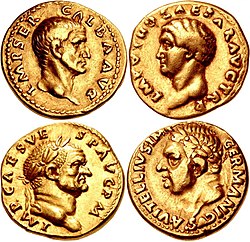
Back የአራቱ ቄሣሮች ዓመት Amharic عام الأباطرة الأربعة Arabic Год чатырох імператараў Byelorussian Годината на четиримата императори Bulgarian Bloavezh ar Pevar Impalaer Breton Godina četiri cara BS Any dels quatre emperadors Catalan ساڵی چوار ئیمپراتۆرەکە CKB Rok čtyř císařů Czech Blwyddyn y Pedwar Ymerawdwr Welsh
This article includes a list of general references, but it lacks sufficient corresponding inline citations. (December 2020) |
| Roman imperial dynasties | ||
|---|---|---|
 | ||
| Year of the Four Emperors | ||
| Chronology | ||
| Succession | ||
|
||
The Year of the Four Emperors, AD 69, was the first civil war of the Roman Empire, during which four emperors ruled in succession: Galba, Otho, Vitellius, and Vespasian.[1] It is considered an important interval, marking the transition from the Julio-Claudians, the first imperial dynasty, to the Flavian dynasty. The period witnessed several rebellions and claimants, with shifting allegiances and widespread turmoil in Rome and the provinces.
In 68, Vindex, legate of Gallia Lugdunensis, revolted against Nero and encouraged Galba, governor of Hispania, to claim the Empire. The latter was proclaimed emperor by his legion in early April. He was notably supported by Otho, legate of Lusitania. Soon after, the legate of a legion in Africa, Clodius Macer, also rebelled against Nero. Vindex was defeated by the Rhine legions at the Battle of Vesontio, but they too rebelled against Nero. Finally, on 9 June 68, Nero committed suicide after being declared a public enemy by the Senate, which made Galba the new emperor. However, Galba was unable to establish his authority over the Empire, as several of his supporters were disappointed by his lack of gratitude. He especially adopted Piso Licinianus as heir (Galba was childless and elderly), instead of Otho, who, it had widely been assumed, would be chosen. Angered by this disgrace, Otho murdered Galba on 15 January with the help of the Praetorian Guard, and became emperor instead. Unlike Galba he rapidly earned considerable popularity, notably by bestowing favours and emulating Nero's successful early years.
Otho still had to face another claimant, Vitellius, who had been acclaimed by the legions of the Rhine on 1 January 69. Vitellius won the First Battle of Bedriacum on 14 April, defeating the emperor. Otho committed suicide the next day, and Vitellius was appointed emperor by the Senate on 19 April. The new emperor had little support outside of his veterans from the German legions, though. When Vespasian, legate of Syria, made his bid known, he received the allegiance of the legions of the Danube as well as many former supporters of Galba and Otho. After his acclamation in Alexandria on 1 July, Vespasian sent his friend Mucianus with a part of his army to fight Vitellius, but the Danubian legions commanded by Antonius Primus had not waited for Mucianus and defeated Vitellius' legions at the Second Battle of Bedriacum on 24 October. Vitellius was subsequently killed by a mob on 20 December. Mucianus arrived several days after and swiftly secured Vespasian's position in Rome (Primus had acted independently from him).
The death of Vitellius did not end the civil war, as the Rhine legions still rejected the rule of Vespasian and the new Flavian dynasty. Some Batavi provincials led by Civilis had fought them since Vitellius' acclamation. In 70, the new regime finally won the legions' surrender after negotiations, mainly because they lacked an alternative to Vespasian. Later, the new regime distorted the events—especially through the writings of the historian Tacitus—in order to remove the embarrassment of having relied on the Batavi to fight Roman legions. The Batavi were therefore said to have revolted against Rome, and the events dubbed the Revolt of the Batavi.[2]
- ^ Martin, Ronald H. (1981). Tacitus and the Writing of History. University of California Press. pp. 104–105. ISBN 0520044274.
- ^ T. E. J. Wiedemann, "From Nero to Vespasian", in Bowman et al., Cambridge Ancient History, vol. X, pp. 280–282.
© MMXXIII Rich X Search. We shall prevail. All rights reserved. Rich X Search